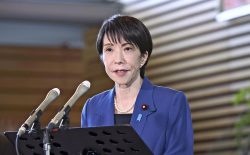15:57 JST, July 7, 2022
The other day I was walking near my home, and I passed a nice-looking casual cafe. Outside it, there was a sign that read, “After all, burger is delicious.” OK! For years, when confronted by English errors on signage in Japan I would feel I needed to react to them, sometimes with humor, sometimes with annoyance. Almost every day I saw a poster related to Tokyo Metro’s “Find my Tokyo” ad campaign, and each time I would snarkily note the imperative coupled with the first-person possessive. Find your Tokyo, you command me? If you carelessly misplaced it, surely it is your own responsibility to locate it!
But I spend enough time correcting my students’ English in classes throughout the week. Maintaining a penchant for sentence structure tweaks as I strolled about was turning my weekends into a busman’s holiday. Strangely though, as I’ve withdrawn from the practice, my husband seems to have taken it up, bringing specimens home for me to evaluate, and disappointed when I sometimes have to tell him that a somewhat unusual phrasing is actually grammatically correct.
This time, what drew my attention was not the use of the singular structure where the plural form would be more appropriate, but the initial “After all.” It seemed to indicate a debate already in progress. The Cambridge English Dictionary defines “after all” as “despite earlier problems or doubts” or “used to add information that shows that what you have just said is true.” Was the cafe reconfirming a commitment to the notion that hamburgers are tasty? Had this been in dispute? I’m not a meat eater, but even I will concede the mouthwatering appeal of those savory discs of umami-packed protein.
The “after all” appeared to be a translation from “yahari” (or one of its variants: “yappari,” “yappa,” or “yappashi”). It’s an adverb that can also mean “as expected” and gets an awful lot of use in Japanese conversation. In order to examine differences in adverbial use in written and spoken Japanese, Bor Hodoscek, a corpus linguistics researcher, and three colleagues compared two language corpus sets. One was the White papers and Law documents from the Balanced Corpus of Contemporary Written Japanese (BCCWJ), coupled with the Scientific and Technical Japanese Corpus (STJC). The other consisted of Yahoo! Q&A, Yahoo! Blogs, as well as Minutes of the Diet from the BCCWJ. There were 1,023 different adverbs used in the formal written corpus set, 2,253 in the informal / spoken corpus set, and 2,887 in the combined sets.
Remarkably, yahari/yappari/yappa/yappashi was the fifth-most common adverb in the spoken corpus, beaten out only by the garden-variety adverbs “dou” (how), “sou” (in that way), “mou” (already), and “kou” (in this way) and ahead of other common adverbs like “chotto” (a bit), “yoku” (often/well), “amari” (not very), and “kanari” (quite). The yahari group also ranked 10th in the combined corpus sets, but it didn’t make the top 30 for the written corpus.
Historical linguist Rumiko Shinzato has traced the yahari journey to adverb superstar over the centuries. It started out as an adverb meaning “being still,” as in this example from 1462: “Keeping the head still (yahari) when facing someone, yet with the hands unsettled is unsightly.” This use had disappeared by the early 20th century, and in its place the current meanings of “as expected” or “after all” made their appearance from the late 17th century. Shinzato, making use of the BTSJC Japanese conversation corpus and the Shokuba corpora of male and female workplace speech, further demonstrates that yahari and its variants have taken on new roles in current usage, beyond their adverbial usage. These include the use of it as: 1) a filler, similar to “you know”; 2) one-word responses, like “Just as I thought”; 3) sentence-final positioning to convey, “if you can catch my drift”; and 4) a discourse marker used when a speaker wishes to intervene.
Considering this repertoire of communicative roles, it’s not surprising yahari and its variations ranks so high, but the question remains — why this particular adverb? For contrast, I took a look at the word frequencies in written and spoken English published by the linguist Geoffrey Leech and two coauthors based on the British National Corpus. Starting from the top of roughly 440 adverbs ranked in terms of rate of occurrence, I tried slotting the adverbs into “( ), hamburgers are delicious.” Among the top 80, these 10 adverbs seemed to work: “however” (ranked 22); “really” (41); “always” (42); “often” (47); “of course” (56); “probably” (59); “actually” (61); “at least” (63); “usually” (79); and “indeed” (80).
Encountering “actually” was a bit of an “aha!” moment. “Actually” not only sounds like something that could potentially appear on a poster about the tastiness of hamburgers outside a cafe, but it also seems to fulfill similar roles in English as 1) and 4) described by Shinzato for yahari. And yet. As the Cambridge English Dictionary notes, “actually” is “used in sentences in which there is information that is in some way surprising or the opposite of what most people would expect.” So despite matching in the functions they satisfy, semantically speaking, yahari and “actually” are poles apart. While yahari seeks to reconfirm what is already known in the face of doubts, “actually” introduces the unanticipated, seeking to get the listener to align to a new view of things.
Hamburgers are generally known to be delicious. There’s no real doubt or surprise about it, and neither word really fits the bill when considered literally. But both slip in nicely, adding a touch of je ne sais quoi to a given phrasing. Yahari suggests the unchanging nature of things, and “actually” lets us know life is full of little frissons of the unforeseen. After all, cultural differences, even in adverbial usage, are actually quite interesting.

Kate Elwood
Elwood is a professor of English at Waseda University’s School of Commerce.
Top Articles in Editorial & Columns
-

Riku-Ryu Pair Wins Gold Medal: Their Strong Bond Leads to Major Comeback Victory
-

40 Million Foreign Visitors to Japan: Urgent Measures Should Be Implemented to Tackle Overtourism
-

University of Tokyo Professor Arrested: Serious Lack of Ethical Sense, Failure of Institutional Governance
-

China Provoked Takaichi into Risky Move of Dissolving House of Representatives, But It’s a Gamble She Just Might Win
-

Policy Measures on Foreign Nationals: How Should Stricter Regulations and Coexistence Be Balanced?
JN ACCESS RANKING
-

Japan PM Takaichi’s Cabinet Resigns en Masse
-

Japan Institute to Use Domestic Commercial Optical Lattice Clock to Set Japan Standard Time
-

Israeli Ambassador to Japan Speaks about Japan’s Role in the Reconstruction of Gaza
-

Man Infected with Measles May Have Come in Contact with Many People in Tokyo, Went to Store, Restaurant Around When Symptoms Emerged
-

Prudential Life Insurance Plans to Fully Compensate for Damages Caused by Fraudulent Actions Without Waiting for Third-Party Committee Review
















